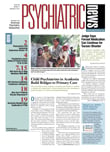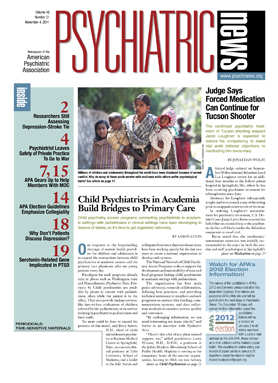APA joined the AMA and more than 50 medical specialty groups as well as state medical societies in urging the special congressional committee charged with devising a deficit reduction plan to include medical liability reform in its proposals.
In separate October 3 letters, APA and the other medical groups told the cochairs of the Joint Select Committee on Deficit Reduction (often called the "supercommittee") that medical liability claims and the high cost of liability insurance for physicians contribute significantly to increasing costs in publicly funded health programs.
"The inefficiencies of our current medical liability system, escalating and unpredictable awards, and the high cost of defending against lawsuits, including those without merit, contribute to the increase in medical liability insurance premiums and add billions of dollars to the cost of health care each year—which means higher government spending on Medicare, Medicaid, and other federal health benefits programs and higher health insurance premiums for patients," they said.
The supercommittee cochairs are Sen. Patty Murray (D-Wash.) and Rep. Jeb Hensarling (R-Texas). It was established in the budget deal to which Congress agreed in August following a showdown over raising the debt ceiling. The 12-member committee—consisting of six members (three Democrats and three Republicans) from both the House and the Senate—was charged, as part of the budget deal, with determining how various federal programs will be cut and how the deficit will be reduced.
"Regular" standing committees of Congress were required to recommend total savings and/or possible revenues of $1.5 trillion by October 15, and the Joint Select Committee must in turn vote on a package of savings/revenues by November 23 and report out a bill to the House and Senate by December 2. If the Joint Select Committee fails to act, or if Congress or the president fails to approve what the committee recommends, then "automatic sequestration"—mandatory cuts—will go into effect that must achieve $1.2 trillion in savings from defense and nondefense funding over 10 years (Psychiatric News, August 19).
In their letters to the cochairs, APA and the other medical groups said that reforming the liability system will "save American taxpayers billions of dollars while protecting patient access to care." They noted that the Congressional Budget Office has estimated that implementing comprehensive medical liability reforms, including limits on noneconomic damages, would reduce the federal budget deficit by $62.4 billion over 10 years. Additionally, the groups noted, the National Commission on Fiscal Responsibility and Reform (appointed by President Obama) recommended in December 2010 that medical liability reform be part of a solution to reduce the federal budget deficit.
The letters are posted at <www.psych.org/MainMenu/AdvocacyGovernmentRelations/GovernmentRelations/MLR-Murray-Letter.aspx> and <www.psych.org/MainMenu/AdvocacyGovernmentRelations/GovernmentRelations/Hensarling-MLR-.aspx>.

